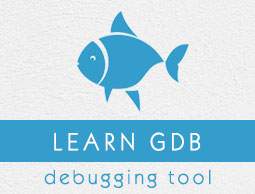
- GNU Debugger Tutorial
- GDB - Home
- GDB - What is GDB?
- GDB - Installation
- GDB - Debugging Symbols
- GDB - Commands
- GDB - Debugging Programs
- GDB - Debugging Examples
- GDB - Summary
- GNU Debugger Useful Resources
- GDB - Quick Guide
- GDB - Resources
GDB - Debugging Programs
Getting Started: Starting and Stopping
gcc -g myprogram.c
Compiles myprogram.c with the debugging option (-g). You still get an a.out, but it contains debugging information that lets you use variables and function names inside GDB, rather than raw memory locations (not fun).
gdb a.out
Opens GDB with file a.out, but does not run the program. You’ll see a prompt (gdb) - all examples are from this prompt.
r
r arg1 arg2
r < file1
Three ways to run “a.out”, loaded previously. You can run it directly (r), pass arguments (r arg1 arg2), or feed in a file. You will usually set breakpoints before running.
help
h breakpoints
Lists help topics (help) or gets help on a specific topic (h breakpoints). GDB is well-documented.
q - Quit GDB
Stepping through Code
Stepping lets you trace the path of your program, and zero in on the code that is crashing or returning invalid input.
l
l 50
l myfunction
Lists 10 lines of source code for current line (l), a specific line (l 50), or for a function (l myfunction).
next
Runs the program until next line, then pauses. If the current line is a function, it executes the entire function, then pauses. next is good for walking through your code quickly.
step
Runs the next instruction, not line. If the current instruction is setting a variable, it is the same as next. If it’s a function, it will jump into the function, execute the first statement, then pause. step is good for diving into the details of your code.
finish
Finishes executing the current function, then pause (also called step out). Useful if you accidentally stepped into a function.
Breakpoints or Watchpoints
Breakpoints play an important role in debugging. They pause (break) a program when it reaches a certain point. You can examine and change variables and resume execution. This is helpful when some input failure occurs, or inputs are to be tested.
break 45
break myfunction
- Sets a breakpoint at line 45, or at myfunction. The program will pause when it reaches the breakpoint.
watch x == 3
Sets a watchpoint, which pauses the program when a condition changes (when x == 3 changes). Watchpoints are great for certain inputs (myPtr != NULL) without having to break on every function call.
continue
Resumes execution after being paused by a breakpoint/watchpoint. The program will continue until it hits the next breakpoint/watchpoint.
delete N
- Deletes breakpoint N (breakpoints are numbered when created).
Setting Variables
Viewing and changing variables at runtime is a critical part of debugging. Try providing invalid inputs to functions or running other test cases to find the root cause of problems. Typically, you will view/set variables when the program is paused.
print x
Prints current value of variable x. Being able to use the original variable names is why the (-g) flag is needed; programs compiled regularly have this information removed.
set x = 3
set x = y
- Sets x to a set value (3) or to another variable (y)
call myfunction()
call myotherfunction(x)
call strlen(mystring)
Calls user-defined or system functions. This is extremely useful, but beware of calling buggy functions.
display x
Constantly displays the value of variable x, which is shown after every step or pause. Useful if you are constantly checking for a certain value.
undisplay x
- Removes the constant display of a variable displayed by display command.
Backtrace and Changing Frames
A stack is a list of the current function calls - it shows you where you are in the program. A frame stores the details of a single function call, such as the arguments.
bt
Backtraces or prints the current function stack to show where you are in the current program. If main calls function a(), which calls b(), which calls c(), the backtrace is
c <= current location b a main
up
down
Move to the next frame up or down in the function stack. If you are in c, you can move to b or a to examine local variables.
return
- Returns from current function.
Handling Signals
Signals are messages thrown after certain events, such as a timer or error. GDB may pause when it encounters a signal; you may wish to ignore them instead.
handle [signalname] [action]
handle SIGUSR1 nostop
handle SIGUSR1 noprint
handle SIGUSR1 ignore
Instruct GDB to ignore a certain signal (SIGUSR1) when it occurs. There are varying levels of ignoring.